Discovery Workshop Review

click here to open the assignment in a new window
Michael: I’d like to open the floor for anyone who wants to ask questions about the discovery workshop.
How much do you think the Catalyst Ranch was significant in its environment or could have done it in the Hyatt ballroom?
There is a principle in this work that going to an unknown environment everyone is playing on a level playing filed.
I found that it was such a wild environment that it made me like anything is possible.
In the complex adaptive systems, I noticed that all the examples are with closed systems. Do you know any of this work that is done with open systems which is what ours is?
Yes. (laughter) The laboratory for CASs is the computer, but there is some work that is done in external environments. Part of what is pushing evolution is that things are changing. We touched on parcellation. This is going to happen in Florida, as the sea rises, Florida will become a chain of islands. The change in the external environment is pushing the evolution. You can force parcellation in a group artificially and it is shown that it evolves faster.
If you notice the continuum of competencies and notice the inside of the arrows, you’ll see a list of all the entities. Someone pointed out that those entities are wildly independent. So what we’re talking about is ecologies. In ecologies there is natural die off and new species emerging. I think that is what is happening here.
The value of diversity really promotes survival and adaptation. As we’re thinking at many levels in this process, rigidity may not take us where we want to go. This will be interesting to keep in mind.
CAS has a property in emergence. Most of us here have been educated in the west and have a linear rational way of looking at the world. There is no way to control or predict emergence. There is a potential dilemma here. In the idea of forming an alliance, we thought about doing a control-based structure. One of the purposes to do the discovery workshop was to look at other kinds of alliances. There are many ways of organizing that may support the emergent properties that are coming out of this.
Should we be Darwinian in our approach? Or should we make sure the school of fish survives?
Yes. (laughter) I think a little of both. It is less useful to create a good medical practice document that everyone signs on to every single word in it. It would be better to have a living document where there is natural cooperation and competition. The day that the GMP document is engraved in someone’s lobby, it will be dead.
The idea of assurance and competence are important and we want something that is uniform and is capable of being measured. Our ability to tell our constituencies that we’ve done this must be based on something consistent. That seems opposed to what you’re saying.
BC: There may be some common elements but the world is way too complex to be governed by a single set of standards. Otherwise we go into a government-regulated system.
MK: There are ways of doing both. There is a right answer syndrome. We’re in a world where the right answer lasts for minutes, maybe.
We decided to create a GMP document not because no one had written one but because there were 10 or 12 versions of it. How do we avoid being right back where we were two years ago?
MK: We have to go back to the ecosystems, there needs to be certain conditions for optimal thriving. You need to look at how to create an environment that allows for the diversity of expression to proliferate so that it doesn’t harm the ecosystem. Right now it looks like there’s a potential threat to the ecosystem.
BC: I would like to clarify something. It is important to have a document that everyone agrees upon but it can be used differently in different contexts.
MK: The purpose of creating the scenarios was to generate dialogue. That has been instigated and it has emerged some ideas. No one has made any pronouncements about the right answer out of this dialogue. You could have a future that is imposed upon you or you could take charge of your own future. There are people here who want to influence that. You have the future of the profession in your hands.
It seems to me that one of the enabling factors to let this happen is to have capacity within the system is accommodation of different views, including ambiguity. We’re still talking as if we’re individuals in the forefront but we need to go to the people who are on the front lines and include them in the conversation.
MK: How many of you know wikis? Most of you. There is a great example of it in wikipedia. Anyone can go in and edit this site. So what if we take our ideas here to the extreme and create a wiki of the good medical practice document and allow anyone in the medical profession to edit it? What if we go even further and say anyone in the world could edit this document? What is emerging in the world today may impact this. What I’ve said is just a thought stimulator and not an advocation.
I think that everyone understands that we have not included practicing physicians in this conversation. When and how is just one of those issues that we have to deal with. So far, it hasn’t been the right time. You guys will know when it is the right time. Some of you have already done that.
However this unfolds, the patient wants to know that they can go somewhere and the team and physician will be competent. That needs to inform how we go forward. We need another level of recursion and getting feedback from practicing physicians and other practicing professionals as well as patients. I do believe in the wisdom of crowds and the right thing will emerge.
MK: There are two more things we need to touch on which are the trusted agents and portfolios.
Discovery Workshop Review Teamlist |
|
|
|
|
|
|
|
| Team 1 |
|
Team 2 |
|
Team 3 |
|
Team 4 |
| Bob Galbraith, MD |
|
Ann Jobe, MD, MSN |
|
Carol Aschenbrener, MD |
|
Barry Egener, MD |
| Carlo DiMarco, DO |
|
Carmen Hooker Odom |
|
Carol Wilhoit, MD, MS |
|
Cathlin Bowman |
| Dennis Kendel, MD |
|
James Carland, MD |
|
Ian Bowmer, MD |
|
James Andriole, DO |
| Don Melnick, MD |
|
Nancy Davis, PhD |
|
James Hallock, MD |
|
Jeanne Heard, MD, PhD |
| James Puffer, MD |
|
Susan Day, MD |
|
Melissa Thomas, MD, PhD |
|
Paul Miles, MD |
| Modena Wilson, MD |
|
William Hartmann, MD |
|
Michael Opipari, DO |
|
Steven Stack, MD |
| Steven Wartman, MD, PhD |
|
|
|
|
|
|
|
|
|
|
|
|
|
|
|
|
|
|
|
|
|
|
|
|
|
|
|
|
|
|
|
|
|
|
| |
|
|
|
|
|
|
| Team 5 |
|
Team 6 |
|
Team 7 |
|
Team 8 |
| Ann Mowery, PhD |
|
Ardis Hoven, MD |
|
Brian Little, MD |
|
Clara Adams Ender, RN, MSN |
| Bruce Spivey, MD |
|
David Swankin, Esq. |
|
Cynda Johnson, MD |
|
John Nylen, MBA |
| Danny Clark, MD |
|
Laurence Gardner, MD |
|
Daniel Wolfson |
|
Joseph Annis, MD |
| Darrell Kirch, MD |
|
Marcia Jackson, PhD |
|
Frederick Finelli, MD, JD |
|
Murray Kopelow, MD |
| David Watt, MD |
|
Melanie Brim |
|
Jim Thompson, MD |
|
Stacy Lankford, MD |
| Kevin Weiss, MD |
|
Norman Kahn, MD |
|
Valerie Smothers |
|
Stephen Clyman, MD |
|
|
|
|
|
|
|
|
|
|
|
|
|
|
|
|
|
|
|
|
|
|
|
|
|
|
|
|
|
|
|
|
|
|
|
| |
|
|
|
|
|
|
| Team 9 |
|
Team 10 |
|
Team 11 |
|
Team 12 |
| Bill Williams, MD |
|
Bob Wise, MD |
|
Edward Susank |
|
Carol Clothier |
| David Leach, MD |
|
Jim Guest |
|
John Crosby, JD |
|
Claudette Dalton, MD |
| Frederick E. Turton, MD |
|
Peter Ajluni, DO |
|
Joseph Webster, MD |
|
James Swartwout |
| Lucian Leape, MD |
|
Rich Hawkins, MD |
|
Michael Sheppa, MD |
|
Kathleen Haley, JD |
| Lynn Eckhert, MD |
|
Richard Schlenk, MD |
|
Robert Rhodes, MD |
|
Pete Scoles, MD |
| Peter Greene, MD |
|
Tim Kowalski, DO |
|
Susan Rudd Bailey, MD |
|
Ronald Ayres, DO |
|
|
|
|
|
|
Todd Dorman, MD |
Output (click on a thumbnail image below to open the larger image in a new window)
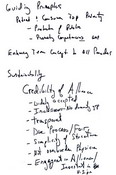 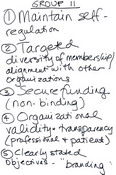 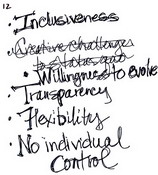 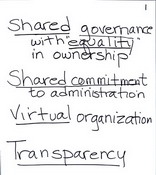
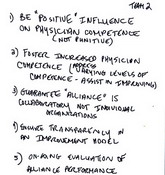 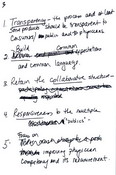 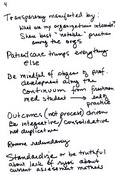 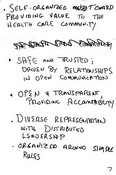
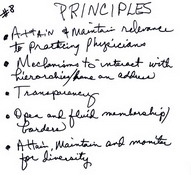 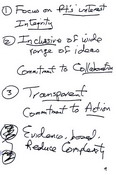 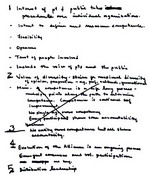 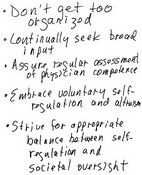
top of page |